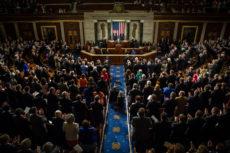Tim Draper • Thursday, August 31, 2017 •
“I will promote freedom at all costs,” is the first line of the Draper University pledge. Draper University of Heroes is a school I created to encourage people with ideas and energy to pursue their visions through entrepreneurship and risktaking. For an entrepreneur, freedom matters most. The ability to try new things without government interference is paramount to the success of an innovative community.
Because freedom is so important to me, I appreciate all the great work the Independent Institute is doing. They understand freedom. Freedom leads to prosperity, to economic growth, and to innovation. While regulation and government control make us feel safer (although at some point they become less safe), they lead to stagnation, fear, and loss of human spirit.
History and studies have shown that a lighter-touch government leads to more innovation, higher economic growth, and a happier, harder working population. A heavy-handed government slows economic growth and stifles creativity. As governments spend more of their people’s wealth, they tend to add more rules and regulations and their innovation and GDP growth decline.
For the past 50 years, Silicon Valley has been perhaps the greatest engine of freedom in the United States, with entrepreneurs and innovators driving great change. It is comforting for innovators to know that Washington, DC, is 3,000 miles away, so they will be relatively unimpeded by the rules and regulations that stymie an innovation economy.
When there is a new innovation, there is almost always a sociological change. That change may affect the customers, competitors, and suppliers of the business, but it also affects the status quo. Fearmongers will spread fear about the new innovation. Once the new innovation starts to spread, these complainers go after the law, the press, and the government to try to keep things the way they were. Lawyers prepare for battle. Competitors fill the press with concerns, and try to make the government take notice and take action. Fortunately, our government generally allows innovation to continue for some time without intervention, but there are some departments that stop innovation in its tracks.
The FDA makes getting a new drug on the market a time-consuming and hugely expensive process, and they often get it wrong. The SEC took a perfectly good law that the JOBS Act provided and plucked it clean of wings so that few entrepreneurs try to raise money that way. The DOD continues to create so many barriers to sell to them that innovators avoid them and we end up with antiquated technologies defending us.
 The Occupy Wall Street movement that began in 2011 protested government policies that favored the 1%, the elite, over the 99%, the masses. Their protests were justified. The Wall Street fat cats who owned mortgage-backed securities were bailed out, but homeowners who had lost their jobs and couldn’t pay their mortgages were foreclosed. But that’s the way Progressive Democracy works.
The Occupy Wall Street movement that began in 2011 protested government policies that favored the 1%, the elite, over the 99%, the masses. Their protests were justified. The Wall Street fat cats who owned mortgage-backed securities were bailed out, but homeowners who had lost their jobs and couldn’t pay their mortgages were foreclosed. But that’s the way Progressive Democracy works. This week the Illinois legislature passed legislation creating the country’s 18th
This week the Illinois legislature passed legislation creating the country’s 18th  Nothing promotes bad public policy as much as disaster. An economic depression gives rise to demands for Keynesian “economic stimulus” spending; elevated rates of unemployment among low-skilled workers give rise to demands for increases in the legal minimum wage; shortages of goods and services caused by floods, hurricanes, tornadoes, and other such acts of God give rise to demands for legal prosecution of “price gougers”; and so on and on.
Nothing promotes bad public policy as much as disaster. An economic depression gives rise to demands for Keynesian “economic stimulus” spending; elevated rates of unemployment among low-skilled workers give rise to demands for increases in the legal minimum wage; shortages of goods and services caused by floods, hurricanes, tornadoes, and other such acts of God give rise to demands for legal prosecution of “price gougers”; and so on and on. 
 In a recent blog post,
In a recent blog post,  The opening lines in the chyron running with the black and white still photos did not bode well for
The opening lines in the chyron running with the black and white still photos did not bode well for  In recent decades economists have devoted great efforts to the analysis of the principal-agent problem (see for example
In recent decades economists have devoted great efforts to the analysis of the principal-agent problem (see for example  Parental choice in education has many advantages, as we see in the growing majority of states with choice programs. Yet using the federal government to expand educational choice is risky, as The Heritage Foundation’s
Parental choice in education has many advantages, as we see in the growing majority of states with choice programs. Yet using the federal government to expand educational choice is risky, as The Heritage Foundation’s  Several months ago, I wrote a
Several months ago, I wrote a 




